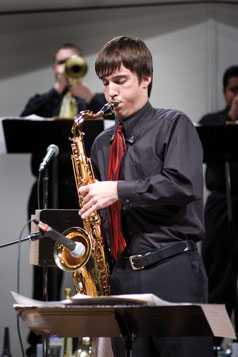Music fills Webster auditorium

Kyle Babbit, freshman secondary education major, plays saxophone. Some members were given the chance to perform solos.
Audience members used the words “spontaneous,” “swinging,” and “improvative” to describe the Southern Jazz Orchestra, which played on Nov. 15.
“Jazz is America’s art form,” said Philip Wise, director of jazz studies. “Jazz is the only music of any idiom that was developed in the United States. The style of jazz music is so different from any other type of music because there is a ‘swing’ element that has to happen, along with jazz being mainly improvised.”
Wise said it takes many elements to pull off a successful concert.
“It takes a lot of dedication and hard work on the part of the students,” Wise said. “Everyone in the group has to be a team player. Each member has to know what their part is, what their role is in the band, and perform at the very best of their ability.”
Outside the three hours of required practices a week, each section within the orchestra gets together for an extra few hours of practice to hone their skills.
“As a musician, it takes a lot of dedication to jazz itself,” said Damon Graue, senior sociology major.
“You could be a great classical player and not be able to play jazz for the simple fact that jazz has a completely different set of rules. Jazz is a feel kind of music more than anything else. The best thing [the jazz orchestra] can do is to listen to other jazz musicians, use their ideas and make them your own.”
Many solos were performed during the concert, but what made them different was they were completely original works by the students.
“It takes a lot of concentration,” Graue said.
“You really have to listen to the rest of the group. We support the soloist by playing off the rhythms the soloist plays. Even though the solo is a solo, it takes a lot of teamwork to have a good sounding solo.”
Wise explained he does not allow music to be “pre-programmed” in a concert.
“Everything heard that night was adlibittum, or improvised on the spot,” said Wise.
“Every time one of the students plays a solo, it’s a little bit different, sometimes dramatically different, and that’s what makes it spontaneous and interesting for the audience and the musician.”
The concert was dedicated to the memory of Dr. Jeremy Kushner, percussion director.
“I asked Kushner to help direct the band with me,” Wise said.
“He was very excited about that and did an excellent job with it. His strength was in percussion ensembles, and teaching percussion lessons.”
There was evidence of enthusiasm and support from the crowd as many cries and “whoops” of approval followed many of the solos.
“There is nothing quite like performing Jazz,” Daue said.
“Its why we play Jazz. We do not practice just to practice. The performance is what its all about. Once you are on stage and start to play, the energy level just goes through the roof, everything is pretty much out of your control, but that’s what you in want in a performance like this.”
Your donation will support the student journalists of Missouri Southern State University. Your contribution will allow us to purchase equipment and cover our annual website hosting costs.



























